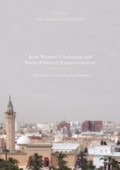Abstract
As a regional pioneer in gender standards, with its 1956 family legislation, and in democratic standards, with its flagship role in the 2011 revolution, Tunisia is an excellent example of the intertwined relationship between gender militancy and political militancy. This chapter illustrates this thesis by highlighting the role that Tunisian women and Tunisian women’s organizations played before and during the country’s political transition, as well as the stakes that they have in its outcome. In particular, it shows how the social progress and the political progress of a country are really two sides of the same coin, and that by advancing the cause of gender equality, Tunisian women have advanced the cause of democracy simultaneously, to the greater benefit of their country and the region as a whole. This has resulted in a modern progressive constitution of which Tunisians are rightfully proud.
Access this chapter
Tax calculation will be finalised at checkout
Purchases are for personal use only
Bibliography
Charrad, M.M. 2002. Nation States, Kin-Based Formations, and Gender in the Maghrib. Annual Meeting the Middle East Studies Association, November. Washington, DC.
Charrad, M.M., and A. Zarrugh. 2014. Equal or Complementary? Women in the New Tunisian Constitution After the Arab Spring. The Journal of North African Studies 19 (2): 230–243.
European Parliament. 2012. Gender Equality Policies in Tunisia. http://www.europarl.europa.eu/egData/etudes/note/join/2012/462502/IPOL-FEMM_NT(2012)_462502_EN.pdf
Fakir, F. 1997. Engendering Democracy and Islam in the Arab World. Third World Quarterly 18 (1): 165–174.
Fregosi, F. 2004. La Regulation Institutionnelle de l’Islam en Tunisie: Entre audace moderniste et tutelle etatique. CNRS, Universite Robert Schumann. Reference:Technical Report, http://www.ceri-science-po.org/. May 2004.
Haddad, T. 1977. Imraatuna fi Chariaa wal Mujtamaa. Tunis: M.T.E.
Inglehart, R., L. Harrison, and S. Huntington. 2000. Culture Matters: How Human Values Shape Progress. New York: Basic Books.
Inglehart, R., and P. Norris. 2003. Rising Tide: Gender Equality and Cultural Change Around the World. Cambridge, UK/New York: Cambridge University Press.
Khalaf, U.A.A. 2013. Constitutions and Constitutional Amendments in the Arab World. Technical report, University of Baghdad, Baghdad, Iraq, 2013.
Khalil, A. 2014. Tunisia’a Women: Partners in Revolution. The Journal of North Africa Studies 19 (2): 186–199.
Labidi, L. 2014. Electoral Practice of Tunisian Women in the Context of a Democratic Transition. Washington, DC: The Wilson Center.
Marshall, S.E. 1984a. Politics and Female Status in North Africa: A Reconsideration of Development Theory. Economic Development and Cultural Change 32 (3): 499–524.
———. 1984b. Paradoxes of Change: Culture Crisis, Islamic Revival, and the Reactivation of Patriarchy. African and Asian Studies 19 (1–2): 1–17.
Mili, A. 2009. Gender Standards vs Democratic Standards: Examples and Counter Examples. International Journal of Women Studies 11 (2): 100–120.
———. 2013. Gender Standards vs Democratic Standards: Revisiting the Paradox. International Journal of Women Studies 14 (2): 3–11.
Moghadam, V.M. 1994. Modernizing Women: Gender and Social Change in the Middle East. Cairo: American University in Cairo Press.
———. 2003. Gender and Social Change in the Middle East. Boulder: Lynne Rienner Publishers. isbn:1-58826-195-6 hc 1-58826-171-9 pb.
Nazir, S.C. 2005. Women’s Rights in the Middle East and North Africa. New York: Freedom House.
UN Authors. 2009. Les quotas de genre en politique en Algerie, au Maroc et en Tunisie. Institut International de Recherche et de Formation des Nations Unies pour la Promotion de la Femme.
Welzel, R.I.C. 2005. Modernization, Cultural Change, and Democracy: The Human Development Sequence. New York: Cambridge University Press.
Acknowledgments
I gratefully acknowledge the following political figures and scholars who graciously agreed to meet me and answer questions: Mr. Taieb Baccouche, PhD, scholar, university professor, political activist, and former minister of education in the first post-revolution government (interviewed in Tunis on July 17, 2013); Ms. Boshra Bel Haj Hmida, attorney, political activist, feminist, and former president of the NGO Tunisian Association of Democratic Women (interviewed by phone on January 15, 2014); Ahlem Belhaj, medical doctor and professor of medicine, director of a hospital ward for child psychology, and president of the NGO Tunisian Association of Democratic Women (interviewed in Tunis on August 22, 2013); Ms. Emna Jebloui, university professor at the University of Tunis, a consultant for the UNDP, director of the Tunisian Institute of Political Science, and an advisor to the president of the National Constitutional Assembly (interviewed in Tunis on August 18, 2013); and Mr. Neji Jelloul, university professor, political activist, and expert in Islamic studies (interviewed in Tunis on August 10, 2013).
Author information
Authors and Affiliations
Editor information
Editors and Affiliations
Rights and permissions
Copyright information
© 2018 The Author(s)
About this chapter
Cite this chapter
Mili, A. (2018). Citizenship and Gender Equality in the Cradle of the Arab Spring. In: Khamis, S., Mili, A. (eds) Arab Women's Activism and Socio-Political Transformation. Palgrave Macmillan, Cham. https://doi.org/10.1007/978-3-319-60735-1_2
Download citation
DOI: https://doi.org/10.1007/978-3-319-60735-1_2
Published:
Publisher Name: Palgrave Macmillan, Cham
Print ISBN: 978-3-319-60734-4
Online ISBN: 978-3-319-60735-1
eBook Packages: Political Science and International StudiesPolitical Science and International Studies (R0)

